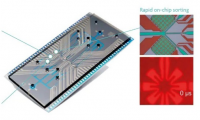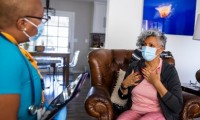-
Cell Sorter Chip Technology to Pave Way for Immune Profiling at POC
- Source: drugdu
- 89
- February 7, 2024
-
COVID-19 recovery disparities uncovered among racial and ethnic groups
- Source: drugdu
- 163
- February 6, 2024
-
FDA sets date for high-profile CAR-T adcomm for Bristol’s Abecma, J&J’s Carvykti
- Source: drugdu
- 95
- February 6, 2024
-
Neural Network Recognizes Breast Cancer on Histological Samples With 100% Accuracy
- Source: drugdu
- 81
- February 5, 2024
-
New Method Enables Detection of Lung Cancer through Blood Tests
- Source: drugdu
- 84
- February 5, 2024
-
Neuro Biotech Alto Adds $128M in IPO Cash for Biomarker-Based Psych Drugs
- Source: drugdu
- 83
- February 5, 2024
-
Usability challenges for at-home devices top ECRI’s 2024 hazards list
- Source: drugdu
- 88
- February 4, 2024
-
Edwards receives FDA approval for first transcatheter tricuspid valve replacement treatment
- Source: drugdu
- 88
- February 4, 2024
-
Veracity Benefits, Levrx Technology Reveal New Digital Health Tech App
- Source: drugdu
- 80
- February 4, 2024
-
Innovative ‘Fragmentomics’ Approach to Enable Earlier Detection of Cancer Using Smaller Blood Draws
- Source: drugdu
- 147
- February 2, 2024
your submission has already been received.
OK
Subscribe
Please enter a valid Email address!
Submit
The most relevant industry news & insight will be sent to you every two weeks.













